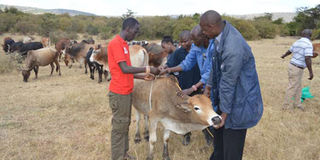BBI: Opportunities beyond politics

A cattle seller sells a beef animal in Mau Narok. Just as in dairy farming, beef cattle production requires good knowledge and expertise to be successful. FILE PHOTO | NATION MEDIA GROUP
What you need to know:
- BBI is this kind of resolve that has freed third-rate economies from the choking grip of corruption, endemic ignorance and bad political leadership.
- As usual, shock political treatment in emerging democracies carry huge political risks and it takes loads of courage from leaders to stay the course in the manner President Uhuru Kenyatta has.
As a career civil servant with a firm grip in law enforcement, security management and public communication, I may be ill-positioned to claim credentials in rural sociology and agro-economics.
ENDEMIC IGNORANCE
But these are no normal tidings: These are the days of the Building Bridges Initiative (BBI), the quintessence with great potential to make Kenya the choice place to invest, live, work and raise families. It is the opposite of what the BBI report terms as “downward drift into sustained poverty, misery, instability and conflict”. For good measure, it points to the fact that we are running out of time.
This sense of urgency takes the shape of an emergency when we remember that there are hundreds, if not thousands, of Kenyans as old as 35 with legitimate advanced degrees in various fields who are now realising that they have zero hope of decent regular earnings from their hard-earned qualifications.
Politically, the BBI in one of the most revolutionary decisions ever made by Kenya’s political leadership.
It is this kind of resolve that has freed third-rate economies from the choking grip of corruption, endemic ignorance and bad political leadership. As usual, shock political treatment in emerging democracies carry huge political risks and it takes loads of courage from leaders to stay the course in the manner President Uhuru Kenyatta has.
MULTIPLIES POVERTY
Maybe, this is why the initial report has painstakingly adopted an explanatory tone and visibly avoided harsh prescriptions. An exception is the management of Nairobi City County, which was, by general consent, a costly oversight during the making of the current Constitution.
In the next phase, there are other areas that qualify for an equally bold approach. They include consolidation of agricultural land, animal husbandly and the environment. Corruption, internal security and law enforcement seem to have embarked on the right course. I will broach the issues of land consolidation and livestock development.
Without a doubt, it is in agriculture where a vast majority of the citizenry can play a significant role in building the Kenya we long for, harness the dividend of devolution and mitigate rural-urban migration. But the practices across the country are not only non-starters but slowly and surely erasing the gains made since colonialism. No leader has had the courage to openly tell the population that our land tenure system only multiplies poverty.
VIBRANT AGRIBUSINESS
Take Maara constituency in Tharaka-Nithi County, where I grew up, as an example. Naturally endowed with enormous agricultural potential, even if one relies on rainfall, the area can be food-secure and provide employment for a critical mass of its population. But it does not because, through subdivision on inheritance, the land has been fragmented into agriculturally useless units.
This is the situation in many other areas that would be sustaining a vibrant agribusiness industry. For example, what would happen if banana farming in Kisii County was consolidated into 100-acre farms? Or does anybody sincerely hope to revive sugar farming in western Kenya as an economically competitive industry with the current land tenure system? One capable of competing with Brazil’s 50,000-acre farms?
BEEF EXPORTS
Do the politicians talking about reviving the coffee and tea economy in central Kenya believe that it will happen on quarter-acre plots? Modern farming is about technology-driven agriculture, value addition and creating economies of scale on farm inputs and marketing, and you don’t talk this on five-acre parcels.
Much more courage must be found to communicate to our pastoralist brethren that escorting cattle for miles as the animals pursue nature-given pasture and water across seasons on private lands, national parks and airports is neither an economic activity nor a tradition: It is an outdated way of life that only serves to perpetuate endless conflicts and spread animal diseases exponentially.
And this courage would be easy to find if we just started figuring out what the economy of, say, Marsabit or Kajiado would look like if the county governments progressively invested in just a million acres of farm-grown hay. It is time our pastoralist population changed from discussing herd sizes to tonnes of beef exports.
TITLE DEEDS
It is time to tell the citizenry that owning a title deed conferring an acre of agricultural land does not hold any promise for you and your children. On the same note, economically empowering livestock development is an impossibility if you cannot tell how long you can keep a cow or a goat to earn a certain amount of income.
The BBI could be the opportunity to do it.
Mr Kiraithe is a principal administrative secretary in the national government. [email protected].





